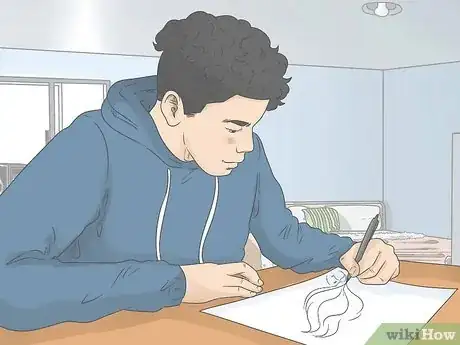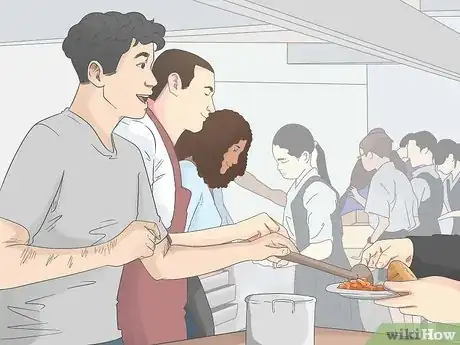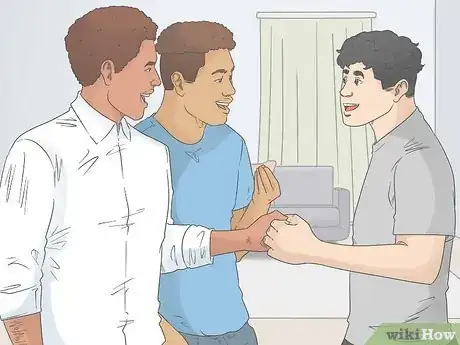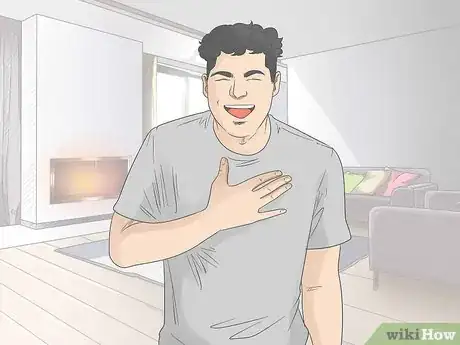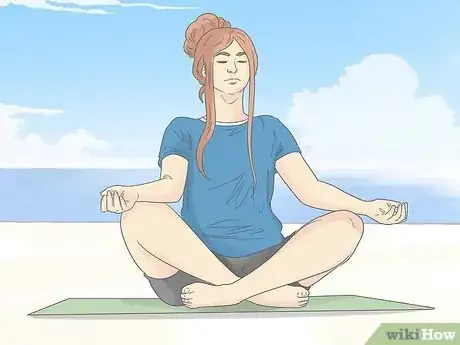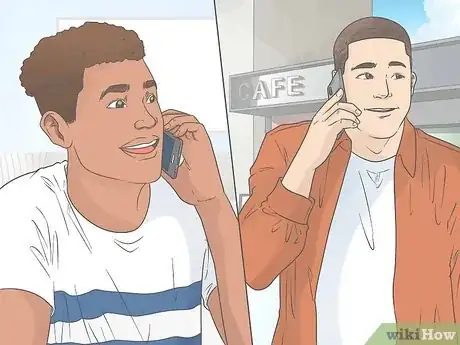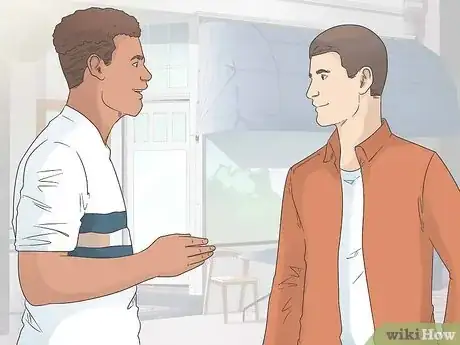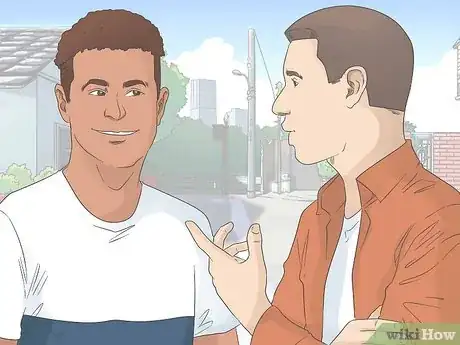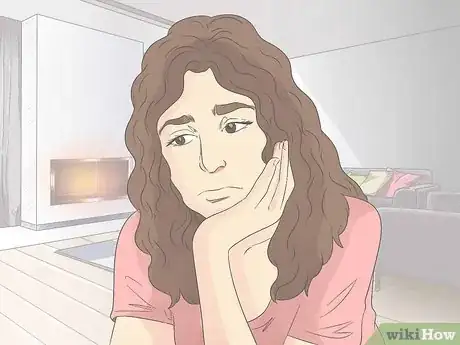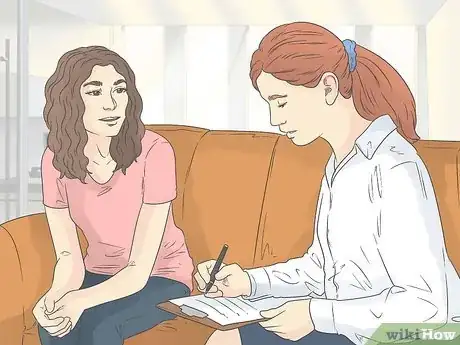This article was co-authored by Chloe Carmichael, PhD. Chloe Carmichael, PhD is a Licensed Clinical Psychologist who runs a private practice in New York City. With over a decade of psychological consulting experience, Dr. Chloe specializes in relationship issues, stress management, self esteem, and career coaching. She has also instructed undergraduate courses at Long Island University and has served as adjunct faculty at the City University of New York. Dr. Chloe completed her PhD in Clinical Psychology at Long Island University in Brooklyn, New York and her clinical training at Lenox Hill Hospital and Kings County Hospital. She is accredited by the American Psychological Association and is the author of “Nervous Energy: Harness the Power of Your Anxiety” and “Dr. Chloe's 10 Commandments of Dating.”
This article has been viewed 30,565 times.
Feeling isolated and lonely can happen in lots of different situations. It may happen when you feel there’s no one you can spend time with or talk to. You can also feel lonely or isolated when you’re around other people, but don’t feel connected to them or when you feel like no one understands you. It’s also a common response to the loss of a relationship either through a breakup or a death. But, you can have meaningful, fulfilling relationships, so don’t consider yourself a hermit yet. There are things that you can do to prevent feelings of isolation and loneliness, regardless of what led you to feel that way. Try expanding your social network, learning to enjoy your time alone, and maintaining the friendships that you have.
Steps
Expanding Your Social Network
-
1Learn something new. You can prevent feelings of isolation and loneliness if you expand your social network. One way to do this is to open yourself and learn a new skill or topic.[1] Taking classes or lessons gives you the opportunity to meet people that you might not meet otherwise. It can also keep you from feeling alone and unconnected to others.
- For example, take a foreign language class to expose yourself to different cultures and to interact with other people.
- See if your city recreation department offers classes or look for continuing education programs.
-
2Volunteer in your community.[2] This is a way to give back and boost your community as well as support causes you care about. It also helps prevent you from feeling isolated. This is because it gives you the chance to meet people with similar interests and concerns and meet people in your community.[3]
- Talk to leaders in the community like your religious leader, coach, or a school counselor about ways that you can volunteer. For example, you might say, "I’d like to volunteer, do you have any suggestions?”
- When possible, volunteer to do things that will allow you to interact with other people. For example, instead of volunteering to stuff envelopes, you might volunteer to greet visitors at an event.
- Check out online resources that list volunteer opportunities in your community, such as VolunteerMatch.org and Idealist.org.
Advertisement -
3Ask for an introduction. One way that you can connect with others and prevent feelings of isolation is to ask someone close to you to introduce you to new people.[4] Having a mutual friend introduce you to others can help make meeting people less awkward for you.
- For example, you might tell your sister, “When we go to the party tonight, would you mind introducing me to a few people since I won’t know anyone?”
- Or for instance, if you are starting a new job you might ask your HR representative or supervisor to introduce you to key people you may need to know.
- Consider joining a friend for an activity or event that you do not normally partake in to meet different people.
-
4Believe in yourself. In order for you to prevent feelings of isolation and expand your social network, you’ll have to believe that you can meet new people. Believing in yourself will give you the confidence you need to introduce yourself to others and widen your circle of friends.[5]
- When you meet new people, remind yourself that you are a great person who is capable of making new friends. Try saying, “I believe that I can meet new people. I don’t have to feel isolated or lonely.”
- Make a list of all the reasons someone would want to spend time with you. For example, you might write, “I’m quirky, thoughtful, interesting, and a great listener.”
- Give yourself a daily compliment. For instance, when you’re getting dressed in the morning, you could tell yourself, “I’m a great person and I’m going to have a great day with the people around me.”
- Keep in mind that you may not connect with everyone you meet and that’s okay. Everyone has unique personalities and interests, and it’s normal for those to bring you closer or distance you from different people.
- Try to be patient. Remember that it takes time to build connections with new people.
Enjoying Time Alone
-
1Get to know yourself. There will be times that you can’t be around other people for some reason or another. Perhaps you are sick and don’t want to get others sick or maybe you are spending a weekday at home while everyone else is at school or at work. You can handle these times and prevent feeling isolated or lonely if you use the time as an opportunity to get to know yourself better.[6]
- Make a list of all the things you want to do in life. You might surprise yourself by some of the things you want to experience. For example, you may think about it and realize you want to learn fencing.
- Spend some time meditating. This is a great way to reduce stress, improve your focus and concentration, and allow you to explore your thoughts and emotions.
-
2Develop hobbies. Instead of allowing feelings of isolation and loneliness to overcome you, you can enjoy your time alone by using it to explore and develop some of your hobbies and interests. When you are doing things you enjoy and find interesting, you may be less likely to feel that you aren’t connected to others.
- Make a list of hobbies or activities that you have been wanting to try. Include group activities, but also include solo activities like gardening, writing poetry, painting, or blogging.
- If you are not sure where to start, research online or visit your public library and browse books on hobbies to see if something new catches your interest.
-
3Use tech in moderation. Social networking and other uses of technology can help you prevent feeling isolated and lonely, but logging in all the time can also prevent you from forming true connections with people.[7] Use technology as a way to connect with people and to keep in touch when you can’t see each other in person, but don’t let it become a substitute for face-to-face contact.
- Instead of emailing or texting your friend, give them a call, do a video conference, or better yet, make plans to spend time together.
- Although social media should not be your primary way of connecting, it is very helpful for times when you need to be home, such as when recovering from an illness.
Maintaining Friendships
-
1Be the first to make contact. Friendships are a ‘two-way street’. Sometimes your friends will reach out to you first, and sometimes you need to be the one to reach out. Being willing to reach out to others instead of always waiting on someone to reach out to you will help you avoid feeling lonely and isolated.[8] It also lets the people that you care about know that you are thinking about them and want them to be a part of your life.
- Call your friends and family members every few days to see how they are doing and what is going on in their life.
- Instead of waiting on a friend to ask you to hang out, you might call them and say, “Hey! Do you want to hang out this weekend?"
- Offer suggestions, such as meeting for lunch, but invite your friends to also offer ideas for what activities to do when you get together.
-
2Talk openly. One reason that people feel isolated and lonely is because they don’t feel that they have made true connections with other people. You may be surrounded by people, but still feel alone if you don’t think anyone understands you. You can prevent these feelings if you open up and let people get close to you.[9]
- Talk about more than superficial things or “small talk” with the people close to you. For instance, don’t just talk with your teammate about the weather and the game.
- Share the good things and the bad things that are happening in your life with your friends and family. For example, you might tell your friend, “I feel like we need to connect more. Can I talk about some things going on with me.”
-
3Listen actively. Another way to maintain the friendships that you have is to be a good listener when people are talking with you.[10] Actively listening gives you the opportunity to learn more about your friends. It also lets people know that you care about them and what they are talking about. This can make you and them feel more connected and less isolated.
- Remove other distractions when you are talking with people close to you so that you can pay attention to the conversation.
- Instead of thinking about how you will respond or letting your mind wander, stay focused on what you all are talking about.
- Listen without feeling the need to have a perfect solution to whatever may be shared with you. Sometimes people just need to be heard.
Understanding Your Feelings
-
1Recognize social isolation. This type of isolation is the absence of social relationships. For example, someone not talking to friends or family for several days at a time. This individual could be at home for several days at a time, and disconnect from all means of social communication (i.e., phone, computer, etc.). When a person who does experience social isolation engages with others, it is very superficial and brief. You may be experiencing social isolation when:
- Your separation from others persists for a few days or more.
- You begin to feel depressed, anxious, guilty, shameful, hopeless, helpless, worthless, and lonely but you continue to isolate yourself.
- You have fears of developing closer relationships with people out of fear of rejection, abandonment, or general social anxiety.
- Your social isolation is affecting a normal productive daily functioning at work or school. (i.e., missing classes or meetings, not attending business social gatherings, difficulty communicating with peers, teachers, or bosses).
-
2Identify emotional isolation. Emotional isolation is when you lack an intimate connection from a partner, family members, or friends. It can also result from social isolation (physical separation from others). Many times, someone becomes emotionally isolated when they feel they are unable to connect with others, or initially build up their defences for protection from emotional distress. If you feel you are emotionally isolated you:
- Keep your emotions to yourself and have difficulty receiving emotional support from others.
- Easily shut down and sometimes feel numb when feeling threatened.
- Are reluctant to speak to communicate with others, unless it is superficial and topic of conversation is not about you and is brief in nature.
- May have been exposed to infidelity, abuse, neglect, or abandonment and have an underlying trust issue with others.
-
3Seek therapy if your isolative behaviors persist. Continued isolation and feelings of loneliness, if persisting despite your efforts of improvement could result in many other emotional and psychological issues if not resolved. Having a therapist to help guide you in this healing process will help in these situations.
- A therapist will be able to help you identify what the underlying issues are that resulted in isolating behaviors and your current feelings of loneliness.[11] There are times when the person does want deeper relationships with others, but due to extreme fear and sometimes paranoia, they may not know how to proceed.
- Alternatively, if the person who is experiencing isolation due to location (i.e., an older person in a rural area), the therapist will be able to connect the individual to community supports to increase their engagement with others and build stronger relationships with others.
Expert Q&A
-
QuestionHow can social isolation barriers be overcome?
 Chloe Carmichael, PhDChloe Carmichael, PhD is a Licensed Clinical Psychologist who runs a private practice in New York City. With over a decade of psychological consulting experience, Dr. Chloe specializes in relationship issues, stress management, self esteem, and career coaching. She has also instructed undergraduate courses at Long Island University and has served as adjunct faculty at the City University of New York. Dr. Chloe completed her PhD in Clinical Psychology at Long Island University in Brooklyn, New York and her clinical training at Lenox Hill Hospital and Kings County Hospital. She is accredited by the American Psychological Association and is the author of “Nervous Energy: Harness the Power of Your Anxiety” and “Dr. Chloe's 10 Commandments of Dating.”
Chloe Carmichael, PhDChloe Carmichael, PhD is a Licensed Clinical Psychologist who runs a private practice in New York City. With over a decade of psychological consulting experience, Dr. Chloe specializes in relationship issues, stress management, self esteem, and career coaching. She has also instructed undergraduate courses at Long Island University and has served as adjunct faculty at the City University of New York. Dr. Chloe completed her PhD in Clinical Psychology at Long Island University in Brooklyn, New York and her clinical training at Lenox Hill Hospital and Kings County Hospital. She is accredited by the American Psychological Association and is the author of “Nervous Energy: Harness the Power of Your Anxiety” and “Dr. Chloe's 10 Commandments of Dating.”
Licensed Clinical Psychologist Try something active like a team sport. This will give you the chance to get some physical activity and widen your social circle. You could also meet other people through online groups and forums.
Try something active like a team sport. This will give you the chance to get some physical activity and widen your social circle. You could also meet other people through online groups and forums. -
QuestionHow can I stop being lonely when I am afraid to reach out to others?
 Chloe Carmichael, PhDChloe Carmichael, PhD is a Licensed Clinical Psychologist who runs a private practice in New York City. With over a decade of psychological consulting experience, Dr. Chloe specializes in relationship issues, stress management, self esteem, and career coaching. She has also instructed undergraduate courses at Long Island University and has served as adjunct faculty at the City University of New York. Dr. Chloe completed her PhD in Clinical Psychology at Long Island University in Brooklyn, New York and her clinical training at Lenox Hill Hospital and Kings County Hospital. She is accredited by the American Psychological Association and is the author of “Nervous Energy: Harness the Power of Your Anxiety” and “Dr. Chloe's 10 Commandments of Dating.”
Chloe Carmichael, PhDChloe Carmichael, PhD is a Licensed Clinical Psychologist who runs a private practice in New York City. With over a decade of psychological consulting experience, Dr. Chloe specializes in relationship issues, stress management, self esteem, and career coaching. She has also instructed undergraduate courses at Long Island University and has served as adjunct faculty at the City University of New York. Dr. Chloe completed her PhD in Clinical Psychology at Long Island University in Brooklyn, New York and her clinical training at Lenox Hill Hospital and Kings County Hospital. She is accredited by the American Psychological Association and is the author of “Nervous Energy: Harness the Power of Your Anxiety” and “Dr. Chloe's 10 Commandments of Dating.”
Licensed Clinical Psychologist Try to make a list of 10 people in your life that you see erratically and could call if you are lonely without even challenging yourself to do that in the moment. Ask yourself why you aren't calling these people right now. Do you need different types of relationships? Or is there something about just getting the call started? What's the hard part about it? If aren't sure, then I really do think a therapist is a good option.
Try to make a list of 10 people in your life that you see erratically and could call if you are lonely without even challenging yourself to do that in the moment. Ask yourself why you aren't calling these people right now. Do you need different types of relationships? Or is there something about just getting the call started? What's the hard part about it? If aren't sure, then I really do think a therapist is a good option.
Warnings
- There’s a difference between feeling a little lonely and suffering from social anxiety or another similar mental health condition. Seek professional help if you find yourself feeling fearful or depressed in social situations.⧼thumbs_response⧽
- In some cases, your loneliness and isolation may be the result of a bully ostracizing you and also attempting to convince others to as well. If you suspect this, report the bullying to an adult and turn to your friends and family for support and encouragement.⧼thumbs_response⧽
References
- ↑ http://www.mayoclinic.org/healthy-lifestyle/adult-health/in-depth/friendships/art-20044860?pg=2
- ↑ Chloe Carmichael, PhD. Licensed Clinical Psychologist. Expert Interview. 29 May 2019.
- ↑ http://www.mayoclinic.org/healthy-lifestyle/adult-health/in-depth/friendships/art-20044860?pg=2
- ↑ https://kidshealth.org/en/kids/make-friends.html?WT.ac=ctg#catfriend
- ↑ https://kidshealth.org/en/teens/shy-tips.html?WT.ac=t-ra#catfriend
- ↑ https://www.psychologytoday.com/blog/high-octane-women/201201/6-reasons-you-should-spend-more-time-alone
- ↑ http://www.mayoclinic.org/healthy-lifestyle/adult-health/in-depth/friendships/art-20044860?pg=2
- ↑ https://kidshealth.org/en/kids/make-friends.html?WT.ac=ctg#catfriend
- ↑ http://www.mayoclinic.org/healthy-lifestyle/adult-health/in-depth/friendships/art-20044860?pg=2
- ↑ http://www.mayoclinic.org/healthy-lifestyle/adult-health/in-depth/friendships/art-20044860?pg=2
- ↑ Chloe Carmichael, PhD. Licensed Clinical Psychologist. Expert Interview. 29 May 2019.
